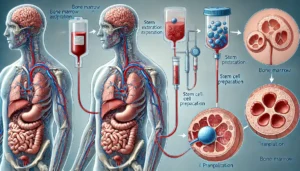Bone marrow transplant (BMT) is a complex yet life-saving medical procedure that replaces damaged or diseased bone marrow with healthy stem cells. This treatment is primarily used for patients with blood-related disorders such as leukemia, lymphoma, aplastic anemia, and certain genetic diseases. It helps restore the body’s ability to produce healthy blood cells, ensuring proper immune function and oxygen transportation. If you or a loved one requires a Bone Marrow Specialist in Faridabad, it is crucial to seek medical care from an experienced specialist. Dr. Sumant Gupta is widely recognized as the best doctor for Bone Marrow Specialist in Faridabad, providing world-class treatment with advanced medical techniques and high success rates.
Understanding Bone Marrow Transplant
Bone marrow is a soft, spongy tissue found inside bones that produces blood cells. When bone marrow fails to function correctly due to disease or damage, a transplant becomes necessary to replace it with healthy stem cells.
A Bone Marrow Specialist in Faridabad involves infusing healthy stem cells into the bloodstream to regenerate new bone marrow. This procedure can be classified into three main types:

Who Needs a Bone Marrow Transplant?
A Bone Marrow Specialist in Faridabad is recommended for patients suffering from various blood disorders and cancers, including:
Best Bone Marrow Specialist in Faridabad
Choosing the right specialist is critical for a successful Bone Marrow Specialist in Faridabad. Dr. Sumant Gupta is a highly experienced oncologist and hematologist known for his expertise in performing successful bone marrow transplants. With years of experience in treating complex blood disorders, he offers personalized treatment plans and advanced medical care to improve patient outcomes.
Steps Involved in Bone Marrow Specialist
The process of Bone Marrow Specialist in Faridabad involves several key steps:
Risks and Complications
While a Bone Marrow Specialist in Faridabad can be a life-saving treatment, it comes with potential risks, such as:
Post-Transplant Care
Recovery after a Bone Marrow Specialist in Faridabad requires ongoing medical supervision and adherence to a strict post-transplant care regimen. Patients should:
Why Choose Dr. Sumant Gupta for Bone Marrow Specialist in Faridabad?
Patients seeking a Bone Marrow Specialist in Faridabad should consider the expertise of Dr. Sumant Gupta, who is renowned for his proficiency in hematology and oncology. Here’s why he is the best choice:
Conclusion
For individuals in need of a Bone Marrow Specialist in Faridabad, expert medical guidance is vital. With extensive experience and advanced treatment options, Dr. Sumant Gupta is the top choice for bone marrow transplants in the region. His commitment to patient care and medical excellence makes him the leading hematologist for this life-saving procedure.
Contact Information
If you or a loved one require a Bone Marrow Specialist in Faridabad, schedule a consultation with Dr. Sumant Gupta today to receive the best medical care and start the journey toward recovery.
FAQs
1. What is a Bone Marrow Transplant (BMT)?
Ans. A Bone Marrow Transplant (BMT) is a medical procedure in which damaged or diseased bone marrow is replaced with healthy stem cells to restore normal blood cell production.
2. Who needs a Bone Marrow Transplant?
Ans. BMT is recommended for patients with conditions such as leukemia, lymphoma, multiple myeloma, severe aplastic anemia, and certain genetic or immune system disorders.
3. What are the types of Bone Marrow Transplants?
Ans. There are two main types:
4. How is a donor matched for a BMT?
Ans. Matching is done through HLA (Human Leukocyte Antigen) typing, a blood test that determines compatibility between the patient and the donor. A close match reduces the risk of complications.
5. What are the risks and complications of BMT?
Ans. Common risks include graft-versus-host disease (GVHD) (in allogeneic transplants), infections, bleeding, organ damage, and rejection of the transplanted cells.
6. How long does the BMT process take?
Ans. The procedure itself takes a few hours, but the entire BMT process, including pre-transplant preparation, transplant, and post-transplant recovery, can take several weeks to months.
7. What is the success rate of Bone Marrow Transplants?
Ans. Success depends on factors like the disease being treated, patient’s health, donor match, and post-transplant care. Many patients achieve long-term remission or cure, but outcomes vary.
8. What is the recovery process after a Bone Marrow Transplant?
Ans. Recovery involves close monitoring, medications to prevent infections and complications, and lifestyle adjustments. It can take several months to a year for the immune system to fully recover.
9. Are there any dietary or lifestyle restrictions after a BMT?
Ans. Yes, patients need to follow a special diet to avoid infections, avoid raw or undercooked foods, maintain hygiene, limit exposure to crowds, and follow doctor’s guidelines on physical activity.
10. Where can I find the best Bone Marrow specialists in India?
Ans. India has several top oncologists and hematologists specializing in BMT. Dr. Sumant Gupta in Delhi NCR is a highly experienced expert in oncology, hematology, and Bone Marrow Transplant procedures.